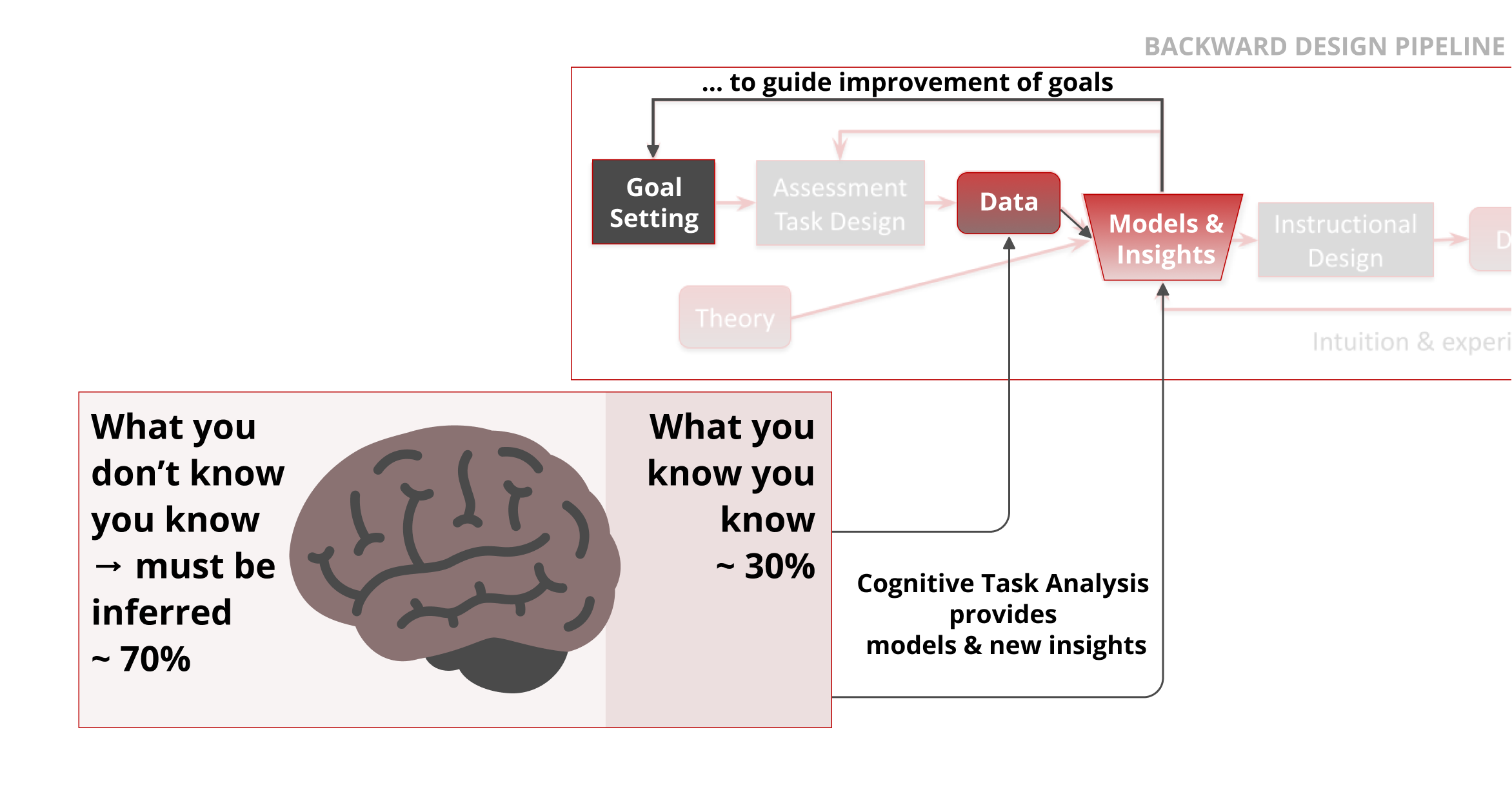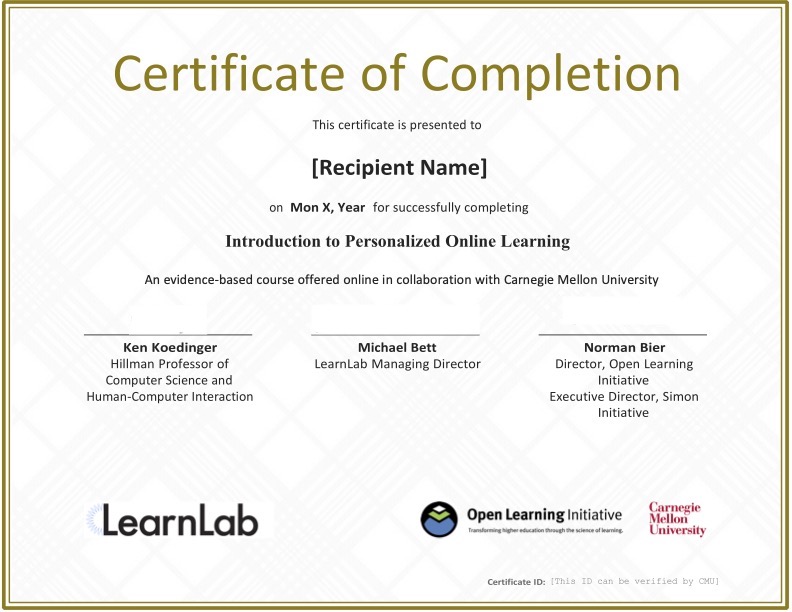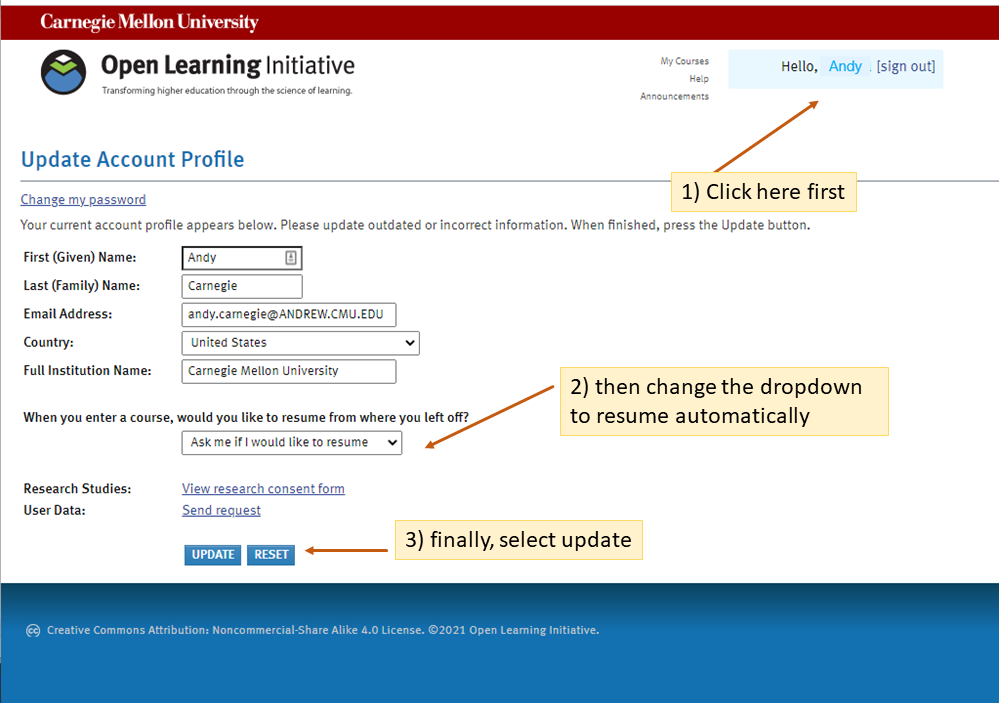Uncovering Implicit Knowledge with Cognitive Task Analysis


Start Any Time
Work on your pace and you will have instructors available to help you answer any questions.

Duration
Approximately 3 weeks, 6-8 hours/week

Fee
$1500 Professional Rate
$400 Full-time Student Rate
*Proof of full time student enrollment required. Acceptable forms of id include a letter from your university’s registrar office or an unofficial transcript. Email your documents to learnlab-help@lists.andrew.cmu.edu
Certificate Course Description:
The great majority of our knowledge is hidden in our subconscious and we are not aware of it (expert blind spot). As a result, an expert in the field creates instructions full of gaps due to the expert blind spot. Cognitive task analysis (CTA) provides a method that helps experts access their hidden knowledge and create better instruction. CTA could also be used to identify areas of struggle for learners and help tackle them.
In this course you will learn about methods of CTA such as Clark’s five steps of CTA via structured interview, principles of contextual inquiry, think aloud, and difficulty factor assessment (DFA). You will learn how to apply each of these methods in a practical context and interpret the result to design effective learning experiences.
Our team hosts office hours for all courses over Zoom on the 2nd and 4th Wednesday of each month, 10:00 AM – 11:00 AM EDT/EST (4:00 PM – 5:00 PM CAT). On 2nd Wednesdays, Dr. Ken Koedinger, who is the Director of the Masters of Educational Technology and Applied Learning Sciences (METALS) program, will be available. On 4th Wednesdays, you will have the opportunity to speak with our learning engineers.
Module 1: Introduction to Cognitive Task Analysis & Contextual Inquiry
- Explain backward design and the interrelationships between goals, assessment, and instruction
- Exemplify using LOGO Debugging by Klahr & Carver
- Explain why knowledge goals must be inferred from models of data
- Recall examples of data leading to new goals
- Recall the goals of Cognitive Task Analysis
- Explain why “if-then” production rules are a good way to express the output (model & insights) of a Cognitive Task Analysis
- Explain and exemplify how Cognitive Task Analysis can be used to identify learning goals
- Explain how Feldon’s goals (for research questions) derive from structured interview CTA guidelines
- Explain how Klahr & Carver’s goals (for debugging) derive from structured interview CTA guidelines
- Recall the four Contextual Inquiry Principles principles and their definitions
- Explain why these principles aid goal specification
Module 2: Empirical CTA – Structured Interviews
- Compare and contrast Clark’s 5 steps of CTA via structured interviews with the principles of Contextual Inquiry
- Explain the importance of focus setting in Contextual Inquiry and preparation in Clark’s structured interview approach to CTA
- Compare and contrast the interview process of CTA via structured interviews with Contextual Inquiry
- Use structured interviews (Cognitive Task Analysis) and contextual inquiry to identify course goals
Module 3: Think Aloud & Theoretical CTA
- Distinguish between four kinds of CTA (theoretical vs. empirical, descriptive vs. prescriptive)
- Use think aloud as a CTA technique
- Perform the steps of doing a think aloud study
- Model think aloud results using subgoals and if-then production rules
- Use model to design and improve instruction
- Apply theoretical CTA to a task domain
- Compare and contrast think aloud and theoretical CTA with other CTA methods
- Describe similarities & differences in effort and cost
- Distinguish the conditions for when to apply each
Module 4: Quantitative Cognitive Task Analysis -Difficulty Factors Assessment
- Perform & explain the steps in a Difficulty Factors Assessment (DFA)
- Given a task, identify a difficulty factor in it and design a matched task without that difficulty
- Create assessment forms; analyze errors
- Model results and use to design instruction
- Explain how the DFA steps implement the E-learning Big Picture
- Compare and contrast Difficulty Factors with prior CTA techniques
- Distinguish between two kinds of empirical CTA
Module 5: Course Project
At the end of the course, you’ll have an opportunity to do a little project where you will conduct a Cognitive Task Analysis to improve elementary math learning. You will also get a chance to analyze and update two existing CTA models related to personal finance. Finally, you will redesign existing instruction and assessment based on CTA implications given to you. That will provide you with a nice experience to apply the fundamentals you will learn in the modules to a larger, more authentic, context. It will be graded by the instructor and you will receive personalized feedback along with a sample solution.
None
Researchers, product/UX designers, and instructional designers who want to improve e-learning design and design effective instruction. Anyone interested in edtech.
What you'll learn
This course will help you:
- Explain how Cognitive Task Analysis techniques can be used to specify cognitive structures & processes associated with task performance
- Structured interviews of experts
- Think alouds of experts & novices performing tasks
- Difficulty Factors Assessments
- Learning curve analysis
- Explain and compare the four Contextual Inquiry Principles with Cognitive Task Analysis
- Context
- PartnerShip
- Interpretation
- Focus
- Conduct theoretical and empirical CTA for a given task
- Analyze four kinds of CTA and create models to improve instruction (theoretical vs. empirical, descriptive vs. prescriptive)
Course Instructors

Dr. Ken Koedinger
is a professor of Human-Computer Interaction and Psychology at Carnegie Mellon University. Dr. Koedinger has an M.S. in Computer Science, a Ph.D. in Cognitive Psychology, and experience teaching in an urban high school. His multidisciplinary background supports his research goals of understanding human learning and creating educational technologies…
Certificate
Upon successful completion of the program, participants will receive a verified digital certificate of completion from Carnegie Mellon University’s Open Learning Initiative.

In addition to the knowledge and immediately applicable frameworks you will gain by attending your selected courses, you will benefit from:
- A digital, verified version of your Executive Certificate (Smart Certificate) you can add to your resume and LinkedIn
- Networking with a global group of your peers and instructors for advancing your career
Register Now
Register and start taking the course in four steps:
1. Enter your email address
2. Watch this short video for instructions on how to register in OLI.
3. For this course, copy the course key: CTA-001
4. Click on this link to Carnegie Mellon University’s Open Initiative to register and try out the course for 48 hours before payment is due.
5. (Optional but highly recommended) Set OLI to automatically resume from where you left off in the course.
1) Click on your name in the upper right corner to bring up your OLI profile settings.
2) Change the option on the dropdown to resume automatically.
3) Lastly, select UPDATE.
You are all set!



